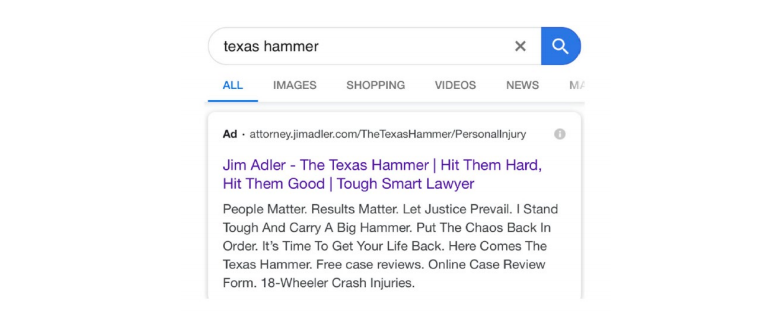Is it considered to be trademark infringement when one company decides to purchase keyword advertisements on search engines or the like, using another’s trademark registrations within the purchased search terms? A new recommendation from a U.S. Magistrate Judge sitting in the Northern District of Texas provides some thoughts on the subject matter.
In the case of Jim S. Adler, P.C. and Jim Adler v. McNeil Consultants, LLC d/b/a Accident Injury Legal Center, et al., the Defendants were alleged to have used certain trademarks — JIM ADLER, THE HAMMER, THE TEXAS HAMMER and EL MARTILLO TEJANO (the “Adler Marks”) — in internet advertising. The Plaintiffs alleged that it was part of a scheme to trade on their goodwill and reputation to deceptively induce prospective clients to mistakenly contact and engage the Defendants, which are involved with a lawyer referral website that seeks out and refers personal injury cases to law firms that have a referral agreement in place.
Plaintiffs’ concern is that Google searches that include the Adler Marks result in search pages that contain Defendants’ advertisements without indentifying a lawyer or law firm as the source of the advertisement. They contend that people searching for Jim Adler or the Adler Firm are likely to think that the advertisements are actually for the Adler Firm or that the Defendants are in some way affiliated with the Plaintiffs.
The Defendants did not dispute that the Plaintiffs own legally protected marks. Instead, they challenged that their use constituted a likelihood of confusion and further challenged the Plaintiffs’ pleadings, arguing that insufficient facts were alleged for a trademark infringement claim. The Magistrate Judge sided with the Defendants.
Utilizing a competitor’s trademark as a keyword for search-engine advertising, on its own, does not constitute trademark infringement. There must be facts alleged that the activity also directs a consumer to a potentially confusing webpage. Consumer confusion is the key and it needs to be properly alleged.
Citing a 2019 case from Connecticut, the court said that “The crux of the issue is whether a defendant’s keyword purchases,
combined with the look and placement of the ads, creates a search results page that misleads, confuses, or misdirects a consumer searching for a brand to the website of a competitor.” In this case, the Defendants did not use the Plaintiffs’ marks or any portion of their marks in the actual advertisements that show up in the search results. Citing a 10th Circuit case from 2013, the court explained that “Where an advertisement does not incorporate the plaintiff’s trademark, there is no likelihood of confusion as a matter of law.”
A similar result was provided in a Southern District of Florida case in 2016 between USA Nutraceuticals Group, Inc. v. BPI Sports, LLC, where the court denied a motion for preliminary injunction based on no likelihood of confusion when the defendant purchased the plaintiff’s trademarks as advertising keywords, but the defendant’s advertisements did not display the trademarks.

